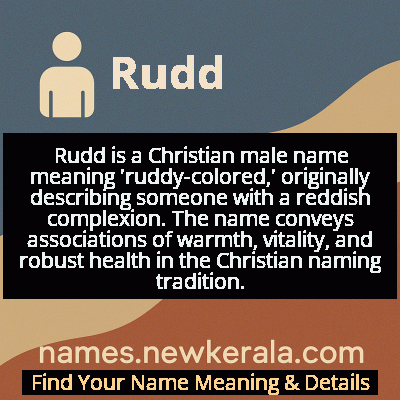Rudd Name Meaning & Details
Origin, Popularity, Numerology Analysis & Name Meaning of Rudd
Discover the origin, meaning, and cultural significance of the name RUDD. Delve into its historical roots and explore the lasting impact it has had on communities and traditions.
Name
Rudd
Gender
Male
Origin
Christian
Lucky Number
2
Meaning of the Name - Rudd
Rudd is a Christian male name meaning 'ruddy-colored,' originally describing someone with a reddish complexion. The name conveys associations of warmth, vitality, and robust health in the Christian naming tradition.
Rudd - Complete Numerology Analysis
Your Numerology Number
Based on Pythagorean Numerology System
Ruling Planet
Moon
Positive Nature
Diplomatic, friendly, artistic, empathetic.
Negative Traits
Over-sensitive, moody, indecisive, prone to self-pity.
Lucky Colours
Green, cream, white.
Lucky Days
Monday.
Lucky Stones
Pearl, moonstone.
Harmony Numbers
1, 3, 4.
Best Suited Professions
Diplomats, mediators, caregivers, artists.
What People Like About You
Cooperative spirit, friendliness, artistic talent.
Famous People Named Rudd
Paul Rudd
Actor
Acclaimed actor known for roles in Marvel Cinematic Universe as Ant-Man and for comedic performances
Rudd Weatherwax
Animal Trainer
Famous Hollywood animal trainer best known for training Lassie
Rudd Concession
Historical Agreement
Important 1888 mining agreement that shaped Southern African colonial history
Rudd Center for Food Policy & Health
Research Institution
Yale University research center focused on food policy and obesity prevention
Name Variations & International Equivalents
Click on blue names to explore their detailed meanings. Gray names with will be available soon.
Cultural & Historical Significance
The name gained particular prominence in English-speaking countries during the 19th century, often used to honor family traits or as a shortened form of Rudolph, which means 'famous wolf.' Its evolution from descriptive nickname to formal given name reflects broader patterns in naming conventions across Western cultures. In modern times, the name maintains its connection to heritage while adapting to contemporary naming preferences for short, strong masculine names. The cultural significance of Rudd lies in its ability to bridge historical tradition with modern sensibility, offering a name that feels both timeless and distinctive.
Extended Personality Analysis
Individuals named Rudd are often perceived as possessing warm, approachable personalities with a natural charisma that draws others to them. They tend to be grounded, practical people with strong connections to family traditions and values, reflecting the name's historical roots in describing physical characteristics and family lineage. Their 'ruddy' association suggests vitality, health, and an energetic approach to life, often manifesting as enthusiasm for outdoor activities, sports, or hands-on work. Many Rudds display a balanced temperament—neither overly aggressive nor passive—with a steady reliability that makes them excellent friends and partners.
They often possess a quiet confidence and determination, approaching challenges with methodical persistence rather than impulsive action. This combination of warmth and stability makes them natural leaders in community and family settings, where their consistent nature provides reassurance to those around them. Their practical wisdom and emotional resilience often make them the 'rock' in relationships, offering steady support during difficult times. While they may not seek the spotlight, their genuine nature and dependable character earn them respect and admiration from those who know them well.
Modern Usage & Popularity
In contemporary times, Rudd remains a relatively uncommon but distinctive given name, often chosen by parents seeking a strong, traditional name with character. While not ranking among the top 1000 names in most English-speaking countries, it maintains steady usage particularly in the United States, United Kingdom, and Australia. The name has experienced mild resurgence in recent years, likely influenced by the popularity of actor Paul Rudd, who has brought positive associations to the name through his successful career and public persona. Modern parents often select Rudd for its simplicity, masculine quality, and connection to nature through its color meaning. It fits well with current naming trends favoring short, strong single-syllable names while offering historical depth uncommon in more fashionable choices.
Symbolic & Spiritual Meanings
Symbolically, Rudd represents warmth, vitality, and earthly connection through its association with the color red and ruddy complexions. The reddish hue connects to life force, passion, and physical vigor, suggesting someone deeply connected to the natural world and human experience. In color symbolism, red represents courage, strength, and determination—qualities often attributed to those bearing this name. The name also carries connotations of authenticity and genuineness, as a ruddy complexion was historically seen as a sign of good health and outdoor living, free from artificiality. In Christian symbolism, the red association connects to both the blood of Christ representing sacrifice and redemption, and the warmth of divine love and charity, making it a name that bridges physical vitality with spiritual significance.

